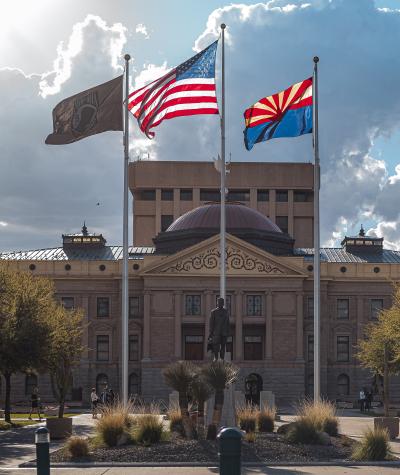The Federal District Court for the District of Arizona has dismissed a lawsuit brought by Americans for Prosperity (AFP) and the Americans for Prosperity Foundation (AFPF) challenging the constitutionality of Proposition 211, also known as the Voters’ Right to Know Act.
The ballot measure was approved by 72% of Arizona voters in November 2022 after many years of hard work by Voters’ Right to Know (VRTK), the ballot measure committee represented by Campaign Legal Center Action (CLCA) in this case.
In the March 20 decision, the Court issued a ringing affirmation of the Act’s constitutionality and Arizona citizens’ right to know who is spending to influence their votes.
The Court also strongly rejected AFP and AFPF’s claims that the Act would chill protected speech and unlawfully compel association between “upstream” contributors, whose money is passed along by intermediary donors, and big campaign spenders.
Prop 211 shines a light on the original sources of secret spending, sometimes called “dark money,” in the Grand Canyon State through a robust traceback disclosure system for campaign-related ads and expenditures.
Under the Act, major spenders are required to disclose the original sources of the large contributions behind their campaign media spending, including any intermediaries who passed along funds from those major contributors, and to name the top three donors to the spender in an on-ad disclaimer.
Importantly, Prop 211 requires these major spenders to allow contributors to “opt out” from having their contributions spent on campaign media spending and thus from having their contributions disclosed.
The federal district court followed well-established Supreme Court precedent and recent decisions from the Ninth Circuit Court of Appeals to hold that disclosure protects the First Amendment right of voters to know who is trying to influence their vote and, ultimately, policymaking decisions by elected officials.
The Court found that Prop 211 is narrowly tailored to advance substantial government interests and thus rejected the plaintiffs’ broad “facial” attack on the law, which was largely based on their misunderstanding of many of the law’s key features.
The Court also ruled that AFP and AFPF had failed to sufficiently demonstrate that their donors are likely to face serious harm from being identified as the original source of campaign contributions.
This decision echoes rulings in Center for Arizona Policy v. Arizona Secretary of State, a state court case challenging Prop 211 under the Arizona State Constitution.
In that case, the Maricopa County Superior Court affirmed the constitutionality of Prop 211 under the Arizona State Constitution in two decisions issued in 2023 and earlier in 2024.
While legal challenges to Proposition 211 and other campaign finance disclosure laws continue, this decision marks another major win for Arizonans, protecting their First Amendment right to be well-informed voters, reducing political corruption, and enhancing informed participation in our democracy.



